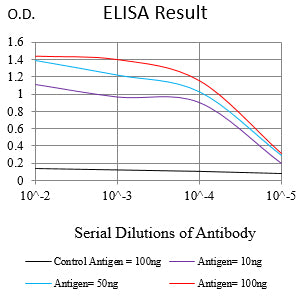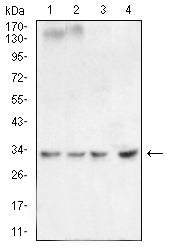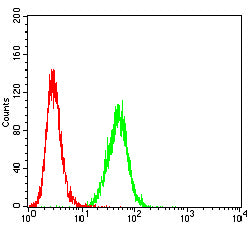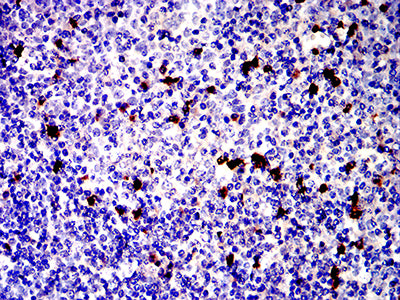



| WB | 1/500 - 1/2000 | Human,Mouse,Rat |
| IF | 咨询技术 | Human,Mouse,Rat |
| IHC | 1/200 - 1/1000 | Human,Mouse,Rat |
| ICC | 技术咨询 | Human,Mouse,Rat |
| FCM | 1/200 - 1/400 | Human,Mouse,Rat |
| Elisa | 1/10000 | Human,Mouse,Rat |
| Aliases | S5.7; CVID6; TAPA1; TSPAN28 |
| Entrez GeneID | 975 |
| clone | 4D4A11 |
| WB Predicted band size | 25.8kDa |
| Host/Isotype | Mouse IgG1 |
| Antibody Type | Primary antibody |
| Storage | Store at 4°C short term. Aliquot and store at -20°C long term. Avoid freeze/thaw cycles. |
| Species Reactivity | Human, Rat |
| Immunogen | Purified recombinant fragment of human CD81 (AA: 113-201) expressed in E. Coli. |
| Formulation | Purified antibody in PBS with 0.05% sodium azide |
+ +
以下是3-4篇关于CD81抗体的代表性文献概览(文献名称、作者及摘要内容总结):
---
1. **文献名称**:*CD81 is a entry receptor for hepatitis C virus*
**作者**:Zhang, J., Randall, G., Higginbottom, A., et al.
**摘要**:该研究通过抗CD81抗体的阻断实验,证明CD81是丙型肝炎病毒(HCV)感染宿主细胞的关键受体,抗体可显著抑制病毒颗粒与宿主细胞的结合,揭示了CD81在HCV感染机制中的核心作用。
---
2. **文献名称**:*The tetraspanin CD81 regulates the expression of CD19 during B cell development*
**作者**:Maecker, H.T., Levy, S.
**摘要**:研究发现CD81与CD19在B细胞表面形成复合物,抗CD81抗体干扰此复合物的形成,导致B细胞活化信号通路受损,表明CD81在B细胞抗原识别及免疫应答中的调控功能。
---
3. **文献名称**:*CD81 promotes tumor cell migration and metastasis by modulating matrix metalloproteinase activity*
**作者**:Deng, X., Li, Q., Hoff, J., et al.
**摘要**:通过抗CD81抗体处理肿瘤细胞,实验显示CD81通过激活基质金属蛋白酶(MMPs)促进癌细胞侵袭和转移,提示靶向CD81的抗体可能具有抑制肿瘤转移的治疗潜力。
---
4. **文献名称**:*Targeting CD81 enhances antitumor immunity by modulating regulatory T cell functions*
**作者**:Vences-Catalán, F., Duault, C., Kuitems, A., et al.
**摘要**:研究表明,抗CD81抗体能够削弱调节性T细胞(Treg)的免疫抑制活性,增强效应T细胞的抗肿瘤反应,为CD81在肿瘤免疫治疗中的应用提供了实验依据。
---
以上文献覆盖了CD81抗体在病毒感染、免疫调控及肿瘤研究中的关键作用,可根据具体研究方向进一步查阅原文。
CD81 antibody targets the CD81 protein, a widely expressed cell surface glycoprotein belonging to the tetraspanin superfamily. Characterized by four transmembrane domains, CD81 forms dynamic complexes with other membrane proteins (e.g., CD19. CD21) to regulate cellular processes like adhesion, signaling, and cell-cell interactions. It plays critical roles in immune modulation, notably as a co-receptor in B-cell activation and development. CD81 also gained prominence as a key entry receptor for hepatitis C virus (HCV), interacting with the viral E2 glycoprotein to facilitate infection.
CD81 antibodies are essential tools in research and diagnostics. They are used to study protein localization, membrane protein interactions, and immune cell functions via techniques like flow cytometry, immunoprecipitation, and immunofluorescence. In clinical contexts, CD81 antibodies help investigate CD81's involvement in diseases, including HCV infection, cancers (e.g., lymphoma, melanoma), and autoimmune disorders. Some therapeutic strategies explore blocking CD81-HCV interactions to prevent viral entry. However, CD81's pleiotropic roles require careful interpretation of antibody-based findings to avoid off-target effects.
Overall, CD81 antibodies bridge fundamental research and translational applications, offering insights into both physiological mechanisms and pathogenic pathways.
×